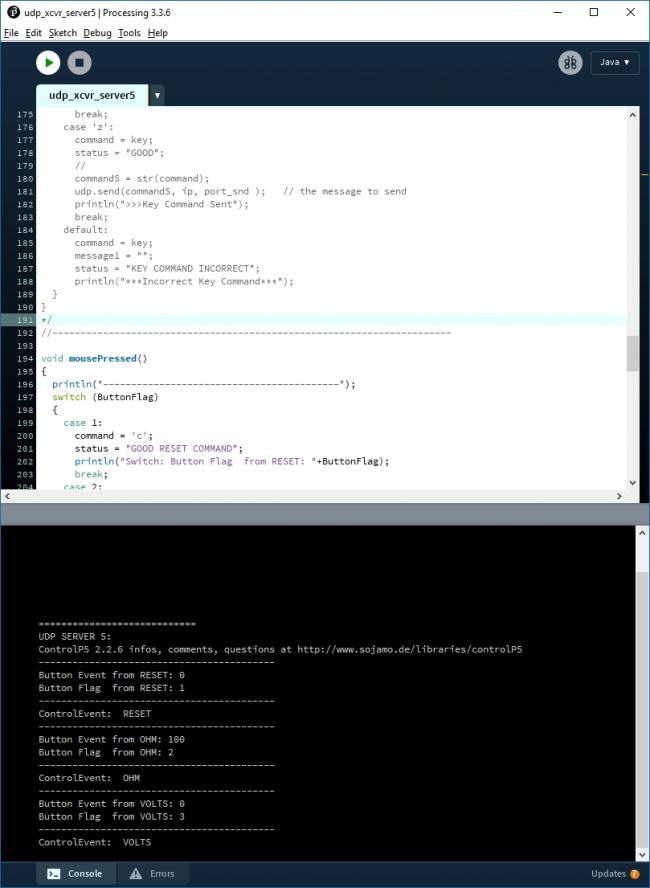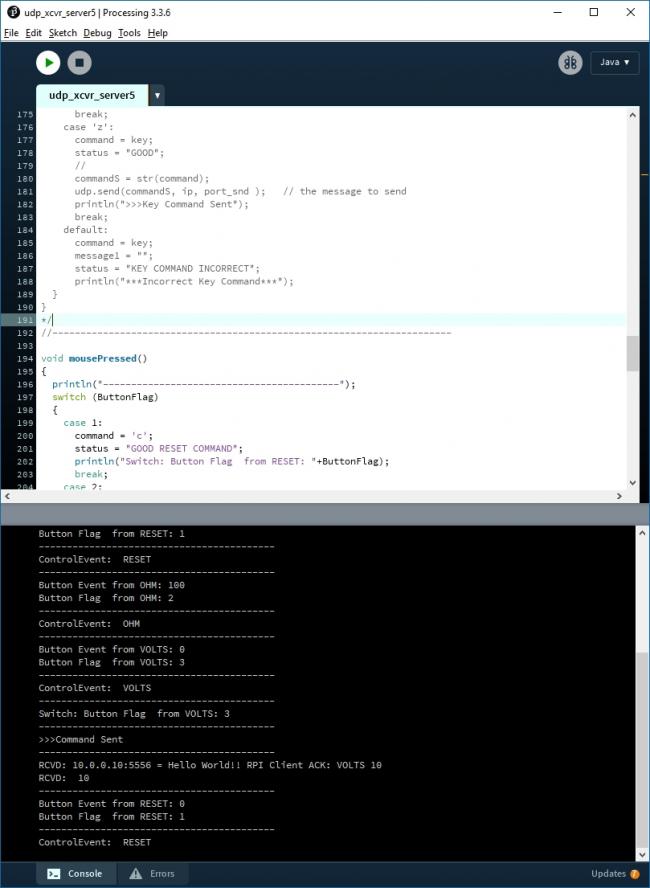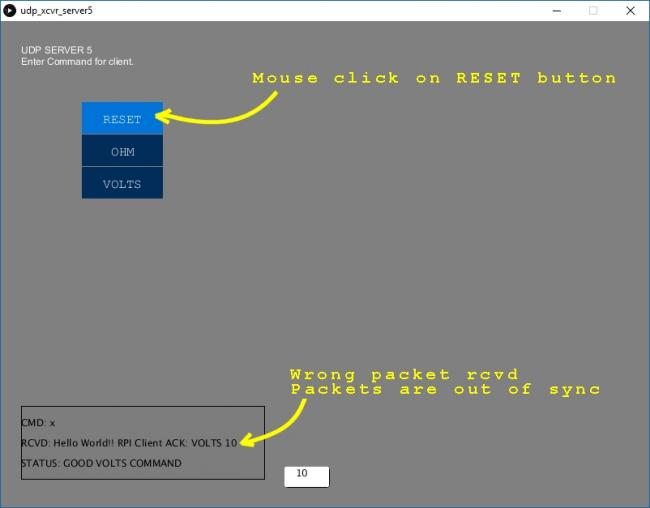Howdy, Stranger!
We are about to switch to a new forum software. Until then we have removed the registration on this forum.
Categories
- All Categories 25.7K
- Announcements & Guidelines 13
- Common Questions 30
- Using Processing 22.1K
- Programming Questions 12.2K
- Questions about Code 6.4K
- How To... 4.2K
- Hello Processing 72
- GLSL / Shaders 292
- Library Questions 4K
- Hardware, Integration & Other Languages 2.7K
- Kinect 668
- Arduino 1K
- Raspberry PI 188
- Questions about Modes 2K
- Android Mode 1.3K
- JavaScript Mode 413
- Python Mode 205
- Questions about Tools 100
- Espanol 5
- Developing Processing 548
- Create & Announce Libraries 211
- Create & Announce Modes 19
- Create & Announce Tools 29
- Summer of Code 2018 93
- Rails Girls Summer of Code 2017 3
- Summer of Code 2017 49
- Summer of Code 2016 4
- Summer of Code 2015 40
- Summer of Code 2014 22
- p5.js 1.6K
- p5.js Programming Questions 947
- p5.js Library Questions 315
- p5.js Development Questions 31
- General 1.4K
- Events & Opportunities 288
- General Discussion 365
Trying to add CP5 buttons using Mouse events with UDP network communication
I'm still learning how to make GUI screens and this is my first attempt to add buttons together with mouse events. I've mostly used a command line style interfaces in the past over the serial port or network. This time I wanted to have a button send the command line in text over the network. So I started using the CP5 library and the mouse events function. But when I try this, something appears to be out of sync. This is a project using the RPI as an instrument to collect data.
But when I add the additional CP5 library and the mouse event function, in 'udp_server5', the packet messages are received out of sync. I don't get the correct packet when I click on any of the buttons. They seem to be out of sync by one or two messages. I would get the correct packet after a couple of mouse clicks. I use the console to print debug messages so I can follow the state of the program. I added some screenshots below to show what happens. The 'udp_server5' code is also show below.
I use the same python code on the RPI for either udp server code on the PC. I already worked out the udp network communications with my RPI with the previous code show below in 'udp_server4'. There, I just use a command line to send a text command over the network. My RPI is running python to decode the command, then acknowledge the command back to the server, along with a packet sequence# so I can know if I'm getting the correct packet. At the moment, I only decode 3 commands.
In the udp_server5 code, I use a button flag to keep track of which button I click on. From looking at the debug messages in the console, I see the button events occur last. I was expecting them to occur first when I click on any button. So the button flag doesn't get updated with the current value. And so the wrong command is sent over the network. When I click on the same button again, the button flag is finally updated with the correct value, so then the right command is sent over the network.
Another item I don't understand from looking at the debug messages. When I start the program I see Control Events already in my console from the 3 buttons I created without clicking on anything. so this also causes my Button Flag to begin with the wrong value.
I'm currently using Processing ver3.3.6. And I used the CP5 library examples from Processing to add the buttons to my code in 'udp server 5'. And I found the mouse event function on the reference page and in the examples. But I'm not sure if these steps are combined in the correct order.
Could I be using the wrong coding technique ?
Here's the code for 'udp_server4'
//=====================================================
//UDP Server 4
//press any key to send a command message from the Server to RPI client
//The RPI client will reply back to the Server
//Send: Server PC (10.0.0.3) to RPI Client(10.0.0.10)
//Receive: RPI Client (10.0.0.10) to Server PC (10.0.0.3)
//ControlP5 Library Buttons
//-----------------------------------------------------------------------------------
// import UDP library
import hypermedia.net.*;
// import Button library
//import controlP5.*;
//
UDP udp; //define the UDP object
//ControlP5 cp5;
//
//-----------------------------------------------------------------------------------
//
int myColor = color(255);
int c1,c2;
int c = 0;
int indent = 25;
int ButtonFlag;
float n,n1;
//
String message1 = "";
String message2 = "00000";
String status = "";
char command;
//
//--------------------------------------------------------------------------------
void setup()
{
//create a new datagram connection
//From Client to Server=5555
//From Server to Client=5556
//
int UDP_port_rcv = 5555;
int UDP_port_snd = 5556;
//
smooth();
size(800, 600);
background(128);
//
fill(255); // Set fill to white
noStroke();
rect(350, 550, 55, 25, 5);
//
text("UDP SERVER 4\nEnter Command for client. ", indent, 40);
//
println("============================");
println("UDP SERVER 4: ");
//noStroke();
//
//--------------------------------------------------------------------------------
// load a new font. ControlFont is a wrapper for processing's PFont
PFont pfont = createFont("Courier",20,true); // use true/false for smooth/no-smooth
//ControlFont font = new ControlFont(pfont,20); //font size for Text Field
//
//-----------------------------------
udp = new UDP( this, UDP_port_rcv );
//
//printout the connection activity
//udp.log( true );
//
// wait for incoming message
udp.listen( true );
}
//--------------------------------------------------------------------------------
//process events
//keep draw() here to continue looping
void draw()
{
//background(128);
//clear text area for packet message
fill(125); // Set fill to gray
stroke(1);
rect(25,475,300,90);
//
//clear area for packet sequence#
fill(255); // Set fill to white
noStroke();
rect(350, 550, 55, 25, 5);
//
//display packet message
fill(0); // Set fill to black
text("CMD: " + command,indent,500);
text("RCVD: " + message1,indent,525);
text("STATUS: " + status,indent,550);
//
//display packet sequence#
fill(0); // Set fill to black
text(message2, 360, 550, 55, 55);
//
}
//--------------------------------------------------------------------------------
//On key pressed event:
//send the command to the client
void keyPressed()
{
String ip = "10.0.0.10"; // the Client IP address
int port_snd = 5556; // Sent Port
String commandS;
switch (key)
{
case 'c':
command = key;
status = "GOOD";
//
commandS = str(command);
udp.send(commandS, ip, port_snd ); // the message to send
println(">>>Key Command Sent");
break;
case 'x':
command = key;
status = "GOOD";
//
commandS = str(command);
udp.send(commandS, ip, port_snd ); // the message to send
println(">>>Key Command Sent");
break;
case 'z':
command = key;
status = "GOOD";
//
commandS = str(command);
udp.send(commandS, ip, port_snd ); // the message to send
println(">>>Key Command Sent");
break;
default:
command = key;
message1 = "";
status = "KEY COMMAND INCORRECT";
println("***Incorrect Key Command***");
}
}
//--------------------------------------------------------------------------------
//Extended handler
//In the Extended Handker,
//The two arguments representing in order,
//the sender IP address and the sender port
public void receive( byte[] data, String ip, int port )
{
// get the "real" message =
// forget the ";\n" at the end <-- !!! only for a communication with Pd !!!
//data = subset(data, 0, data.length-2);
//String message = new String( data );
message1 = new String(data);
//Extract Packet Sequence#
message2 = new String(message1.substring(35,message1.length()));
//print the result
println( "RCVD: "+ip+":"+port+" = "+""+message1);
//print packet sequence#
println( "RCVD: "+message2);
//
}
//=============================================================
Here's the code for 'udp_server5'
//=====================================================
//UDP Server 5
//click mouse to send a command message from the Server to RPI client
//Send: Server PC (10.0.0.3) to RPI Client(10.0.0.10)
//Receive: RPI Client (10.0.0.10) to Server PC (10.0.0.3)
//ControlP5 Library Buttons
//-----------------------------------------------------------------------------------
// import UDP library
import hypermedia.net.*;
// import Button library
import controlP5.*;
//
UDP udp; //define the UDP object
ControlP5 cp5;
//
//-----------------------------------------------------------------------------------
//
int myColor = color(255);
int c1,c2;
int c = 0;
int indent = 25;
int ButtonFlag;
float n,n1;
//
String message1 = "";
String message2 = "00000";
String status = "";
char command = ' ';
//
String ip = "10.0.0.10"; // the Client IP address
int port_snd = 5556; // Sent Port
byte[] data;
//
//--------------------------------------------------------------------------------
void setup()
{
//create a new datagram connection
//From Client to Server=5555
//From Server to Client=5556
//
int UDP_port_rcv = 5555;
int UDP_port_snd = 5556;
//
smooth();
size(800, 600);
background(128);
//
fill(255); // Set fill to white
rect(350, 550, 55, 25, 5);
//
text("UDP SERVER 5\nEnter Command for client. ", indent, 40);
//
println("============================");
println("UDP SERVER 5: ");
//noStroke();
//
//--------------------------------------------------------------------------------
// load a new font. ControlFont is a wrapper for processing's PFont
PFont pfont = createFont("Courier",20,true); // use true/false for smooth/no-smooth
ControlFont font = new ControlFont(pfont,20); //font size for Text Field
//
cp5 = new ControlP5(this);
cp5.enableShortcuts();
frameRate(50);
//
// create a new button
cp5.addButton("RESET")
.setValue(0)
.setPosition(100,100)
.setSize(100,39)
.setId(2);
;
// create a new button
cp5.addButton("OHM")
.setValue(100)
.setPosition(100,140)
.setSize(100,39)
.setId(2);
;
// create a new button
cp5.addButton("VOLTS")
.setPosition(100,180)
.setSize(100,39)
.setValue(0)
.setId(2);
;
//--------------------------------------------------------------------------------
// change the font and content of the captionlabels
// for both buttons create earlier.
cp5.getController("RESET")
.getCaptionLabel()
.setFont(font)
.toUpperCase(false)
.setSize(16)
;
//
cp5.getController("OHM")
.getCaptionLabel()
.setFont(font)
.toUpperCase(false)
.setSize(16)
;
//
cp5.getController("VOLTS")
.getCaptionLabel()
.setFont(font)
.toUpperCase(false)
.setSize(16)
;
//-----------------------------------
udp = new UDP( this, UDP_port_rcv );
//
//printout the connection activity
//udp.log( true );
//
// and wait for incoming message
udp.listen( true );
}
//--------------------------------------------------------------------------------
//process events
// keep draw() here to continue looping
void draw()
{
//background(128);
//clear text area for packet message
fill(125); // Set fill to gray
stroke(1);
rect(25,475,300,90);
//
//clear number area for packet sequence#
fill(255); // Set fill to white
noStroke();
rect(350, 550, 55, 25, 5);
//
//display packet message
fill(0); // Set fill to black
text("CMD: " + command,indent,500);
text("RCVD: " + message1,indent,525);
text("STATUS: " + status,indent,550);
//
//display packet sequence#
fill(0); // Set fill to black
text(message2, 360, 550, 55, 55);
//
}
//--------------------------------------------------------------------------------
//On key pressed event:
//send the command to the client
void keyPressed()
{
String ip = "10.0.0.10"; // the Client IP address
int port_snd = 5556; // Sent Port
String commandS;
println("------------------------------------------");
switch (key)
{
case 'c':
command = key;
status = "GOOD";
//
commandS = str(command);
udp.send(commandS, ip, port_snd ); // the message to send
println(">>>Key Command Sent");
break;
case 'x':
command = key;
status = "GOOD";
//
commandS = str(command);
udp.send(commandS, ip, port_snd ); // the message to send
println(">>>Key Command Sent");
break;
case 'z':
command = key;
status = "GOOD";
//
commandS = str(command);
udp.send(commandS, ip, port_snd ); // the message to send
println(">>>Key Command Sent");
break;
default:
command = key;
message1 = "";
status = "KEY COMMAND INCORRECT";
println("***Incorrect Key Command***");
}
}
//-----------------------------------------------------------------------
void mousePressed()
{
println("------------------------------------------");
switch (ButtonFlag)
{
case 1:
command = 'c';
status = "GOOD RESET COMMAND";
println("Switch: Button Flag from RESET: "+ButtonFlag);
break;
case 2:
command = 'z';
message1 = "";
status = "GOOD OHM COMMAND";
println("Switch: Button Flag from OHM: "+ButtonFlag);
break;
case 3:
command = 'x';
message1 = "";
status = "GOOD VOLTS COMMAND";
println("Switch: Button Flag from VOLTS: "+ButtonFlag);
break;
}
sendcmd();
}
//--------------------------------------------------------------------------------
//Transmit Command
public void sendcmd()
{
//String ip = "10.0.0.10"; // the Client IP address
//int port_snd = 5556; // Sent Port
//
println("------------------------------------------");
String commandS = str(command);
udp.send(commandS, ip, port_snd ); // the message to send
println(">>>Command Sent");
}
//--------------------------------------------------------------------------------
// Extended handler
//In the Extended Handker,
//The two arguments representing in order,
//the sender IP address and the sender port
public void receive( byte[] data, String ip, int port )
{
//String message = new String( data );
println("------------------------------------------");
message1 = new String(data);
message2 = new String(message1.substring(35,message1.length()));
//print the result
//println( "receive: \""+message+"\" from "+ip+" on port "+port );
println( "RCVD: "+ip+":"+port+" = "+""+message1);
println( "RCVD: "+message2);
//
}
//-----------------------------------------------------------------------
public void controlEvent(ControlEvent theEvent) {
println("------------------------------------------");
println("ControlEvent: ",theEvent.getController().getName());
n = 0;
}
//-----------------------------------------------------------------------
// function RESET will receive changes from
// controller with name COLORA
public void RESET(int theValue) {
println("------------------------------------------");
println("Button Event from RESET: "+theValue);
ButtonFlag = 1;
println("Button Flag from RESET: "+ButtonFlag);
}
//-----------------------------------------------------------------------
// function OHM will receive changes from
// controller with name COLORB
public void OHM(int theValue) {
println("------------------------------------------");
println("Button Event from OHM: "+theValue);
ButtonFlag = 2;
println("Button Flag from OHM: "+ButtonFlag);
}
//-----------------------------------------------------------------------
// function VOLTS will receive changes from
// controller with name COLORC
public void VOLTS(int theValue) {
println("------------------------------------------");
println("Button Event from VOLTS: "+theValue);
ButtonFlag = 3;
println("Button Flag from VOLTS: "+ButtonFlag);
}
//====================================================
Here's a screenshot from the console in when starting 'udp_server5'

Here's a screenshot from the console when I click on the RESET button in 'udp_server5'

Here's a screenshot from the gui screen when I click on the RESET button in 'udp_server5'


Answers
I have seen this before in controlP5. There are two ways to handle this issue. Either work with states in your program. Initially when your sketch just starts, you set it into initState. When you are done placing your elements you change the state to ready state. You restrict yourself to change variables only when you are in certain states. For example:
Another approach is to initialize your session within a single function call. This function makes sure your variables have the right values. It is enough to call this function at the end of setup(). Example below.
Kf
I believe you could solve your problem if you add at the end of setup:
ButtonFlag=0;I was trying to reproduce the problem. Adding the previous line seems to fix it. I believe there was only once when it was out of synch. I am suspecting it could be the UDP call that might take a bit longer to return. If this is a problem, you could add
delay(500);at the end of setup().On a side note, variables's first letter is always in lower case, so I would use buttonFlag instead.
Kf
kfrajer, thanks for the coding tips. I first tried your suggestion of placing the
buttonFlag=0;at the end of setup(). That fixed the initial state of buttonFlag. But then I noticed something else in the console debug messages. The first time I clicked the mouse on a button, there was no command being sent over the network. I saw that the switch statement in the mousepressed() function fell thru all the time because buttonflag was not getting updated properly, it was always zero. On the 2nd time I clicked a button, then the buttonFlag was updated. But the Button events were still occurring after the mouse click event.So then I saw in your example that you included a mouseReleased() function. So I thought maybe I should move the Switch statement to that function instead. Well, that fixed everything.
From looking at the debug messages, the program flow now shows what I was expecting.
I see button event first,
then in mouseReleased(), the Switch status, then the UDP send status,
then in the UDP receive function, the message, IP addr, and packet sequence#
And the packets are always in sync now no matter in what order I click the buttons. And I always get the correct acknowledgement and sequence# from the RPI. I'm not sure why there's a difference in code behavior yet by doing this, just so glad it's working now.
The other thing I noticed, I had to include a default case in that switch statement inside mouseReleased(). To keep it from sending any valid commands. Because I noticed when I clicked anywhere in the gui screen it would still send the last known command over the network. And so this keeps that from sending any valid commands.
If you have any further tips, please let me know
thanks !!
Here's the latest code
Thank you for sharing your solution and for the extra comments. Not sure why I used mouseReleased() in my example. Also, adding a default case is important. Or more importantly is to ensure you only send commands for valid user triggers. Glad to hear everything is working now.
Kf